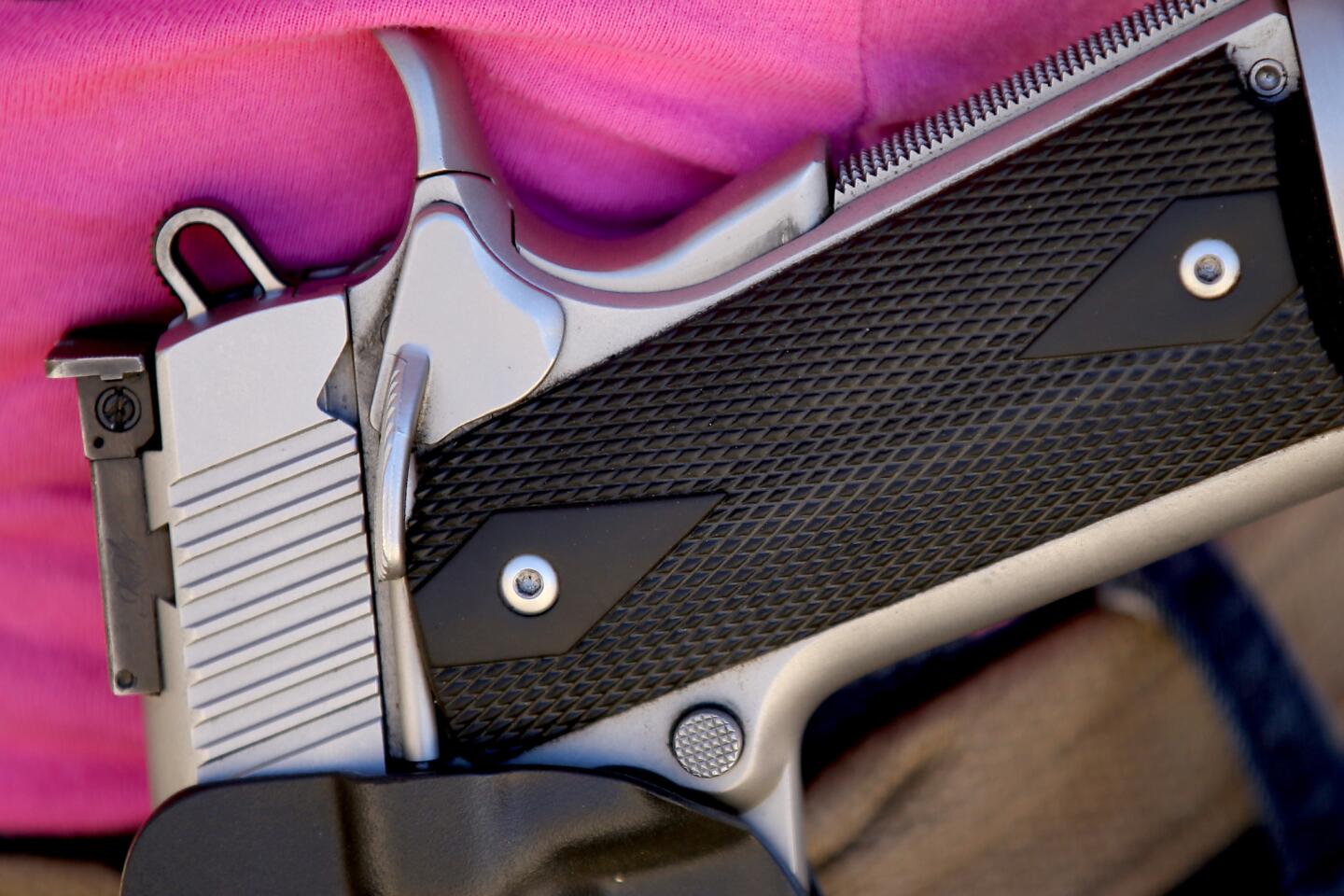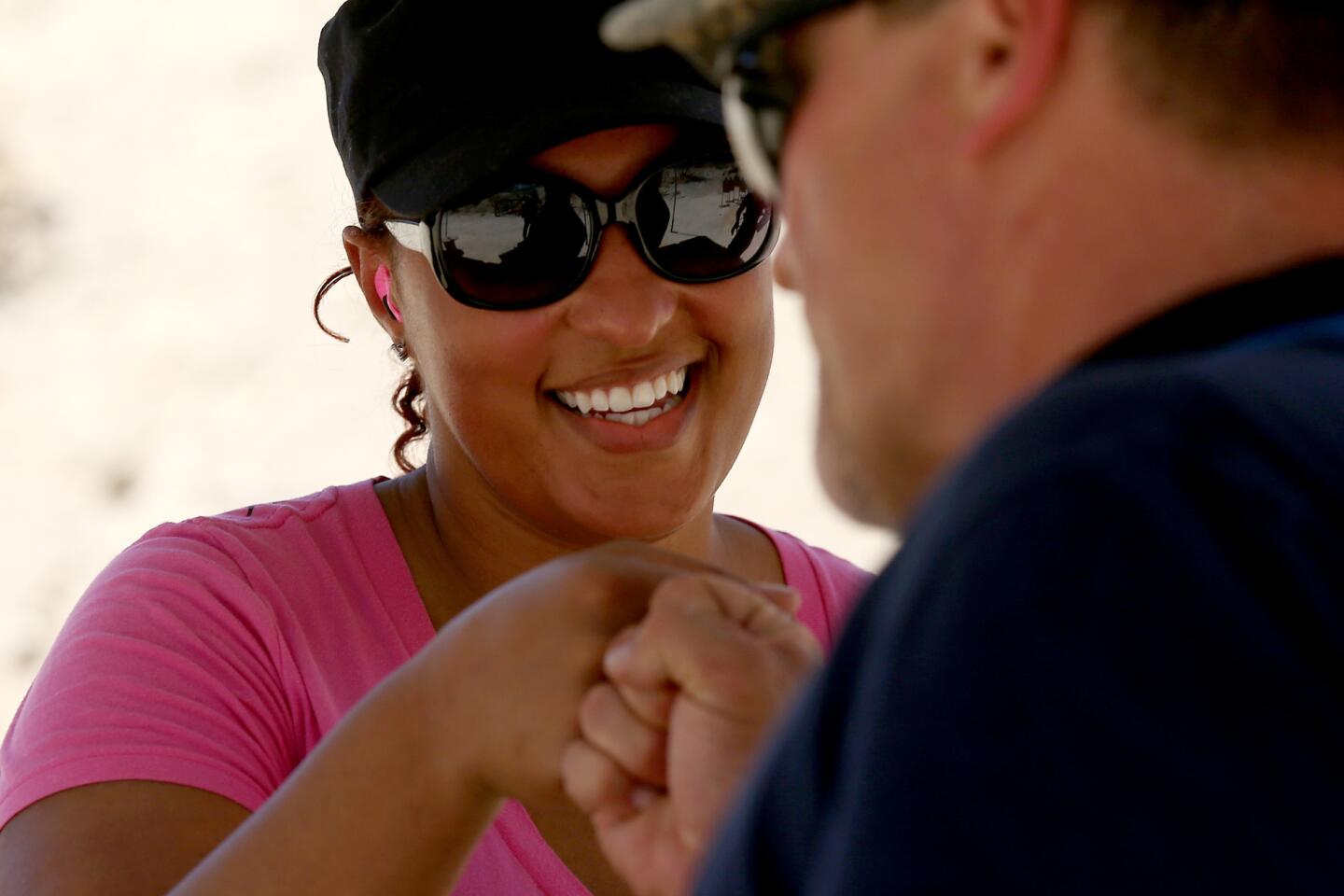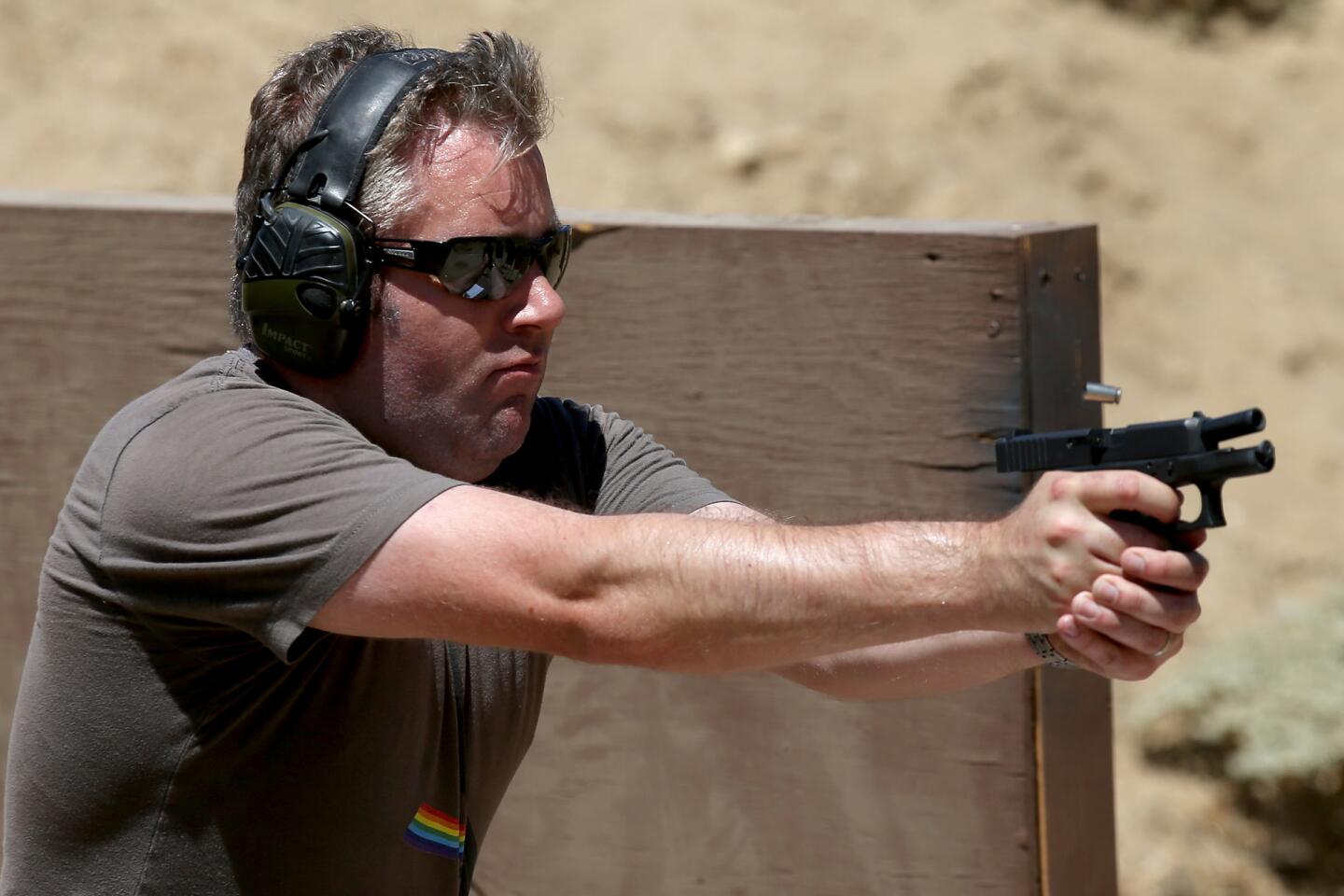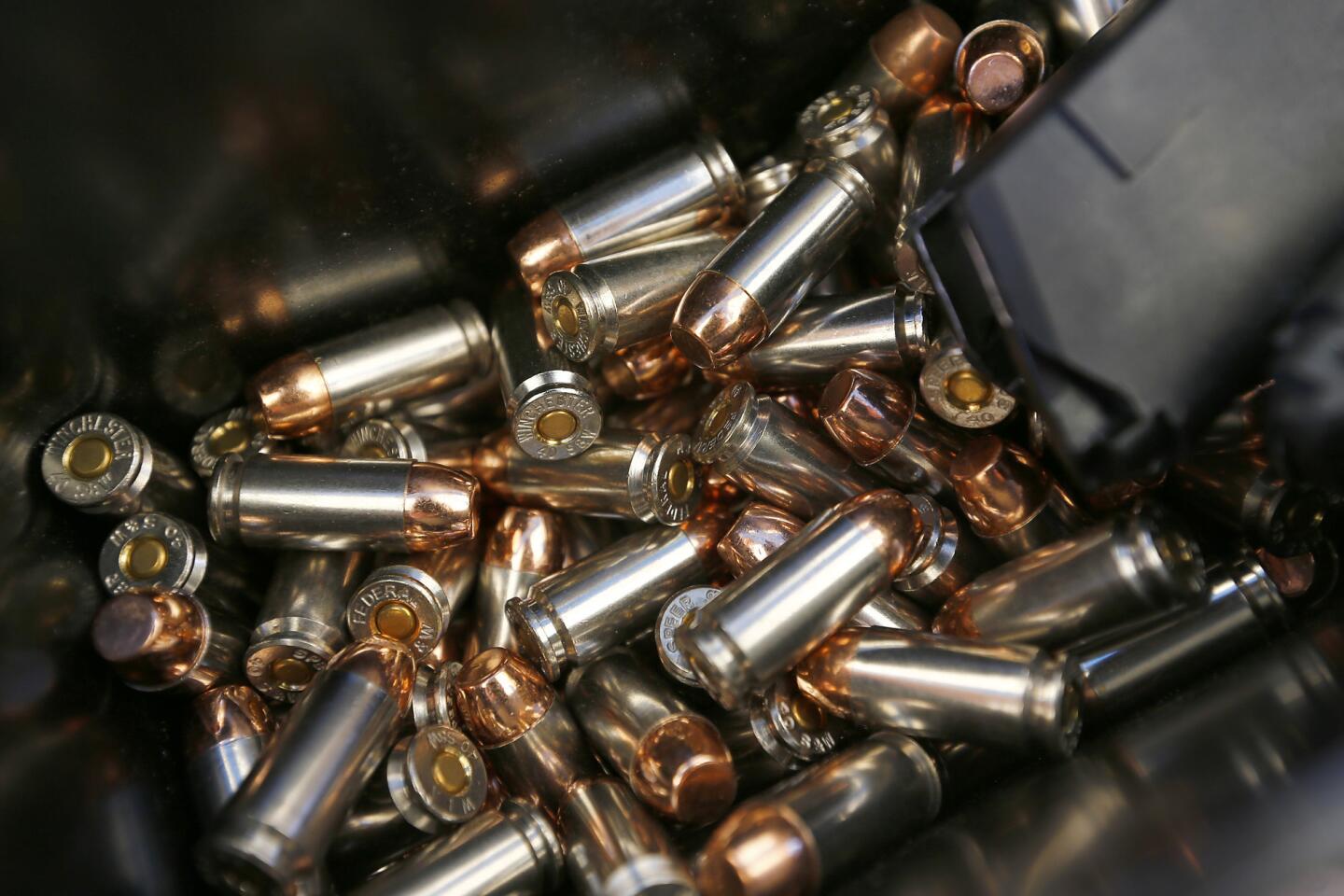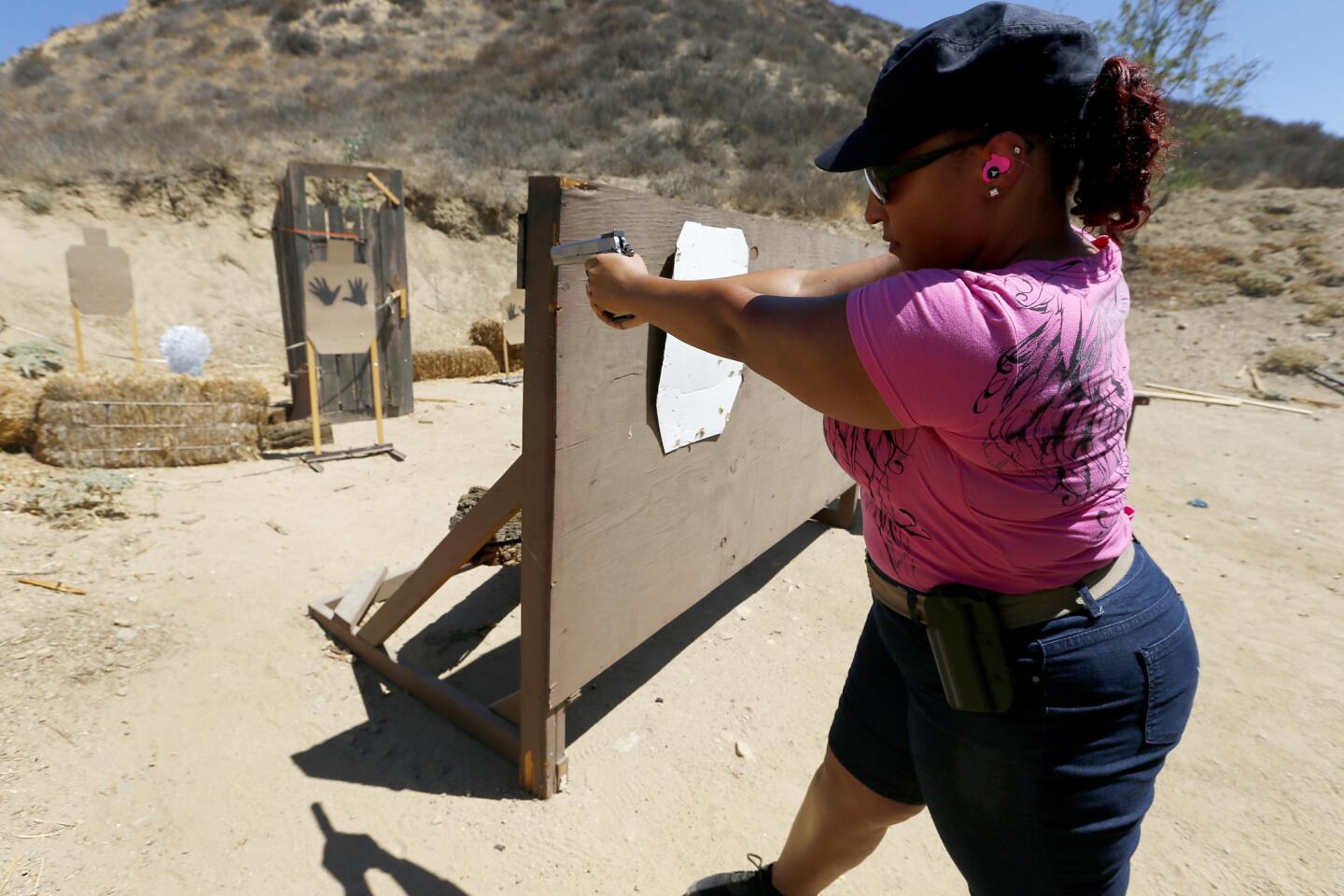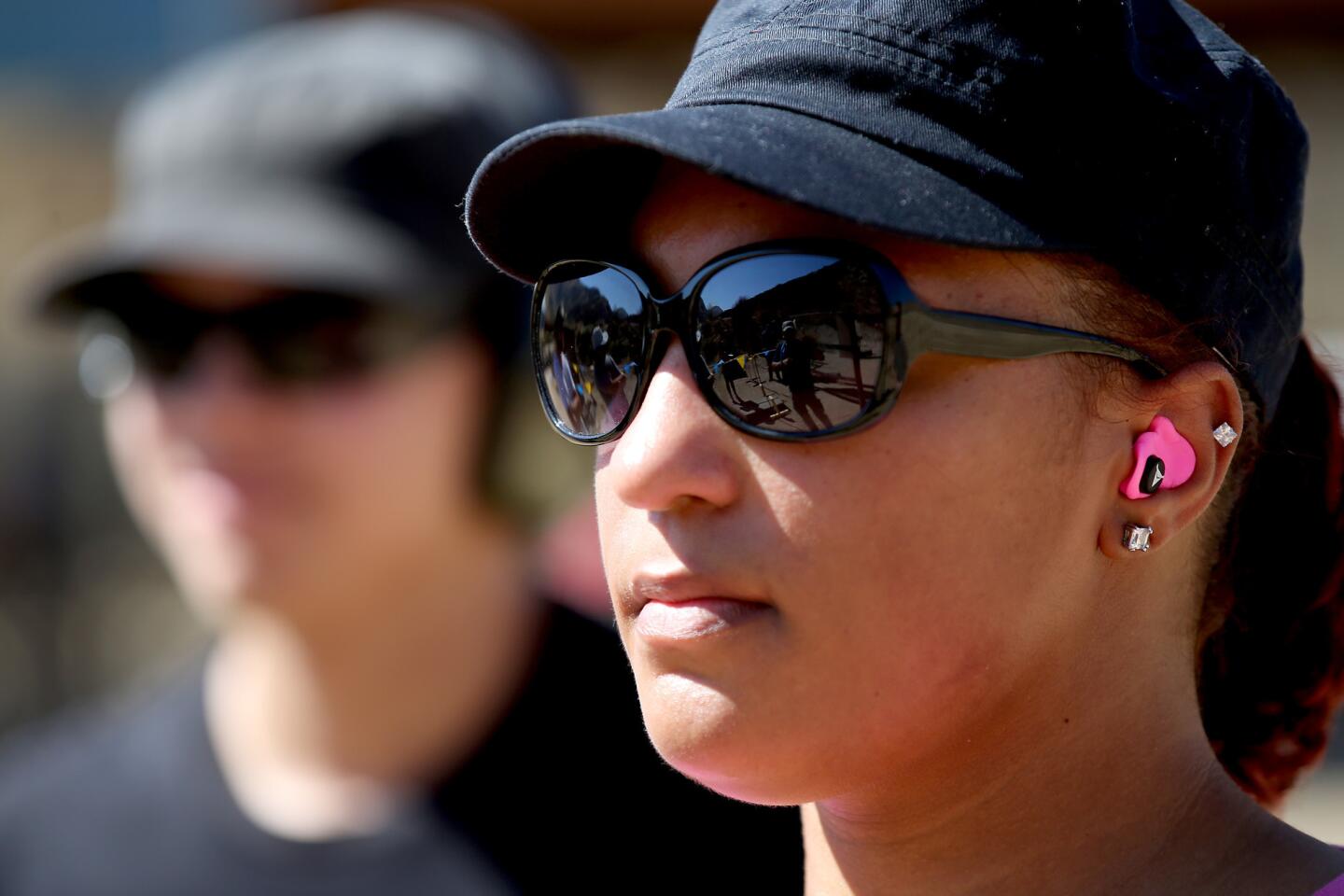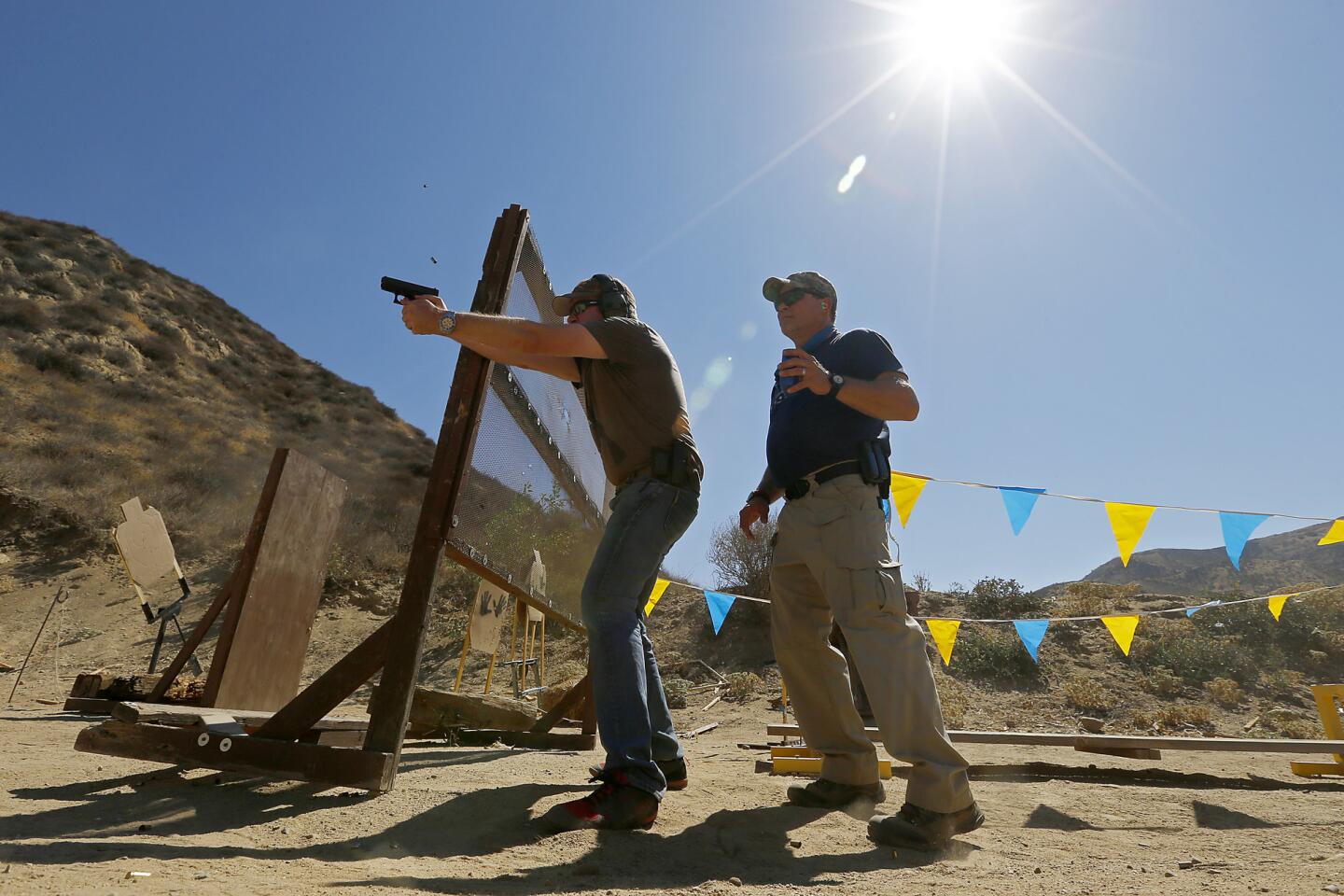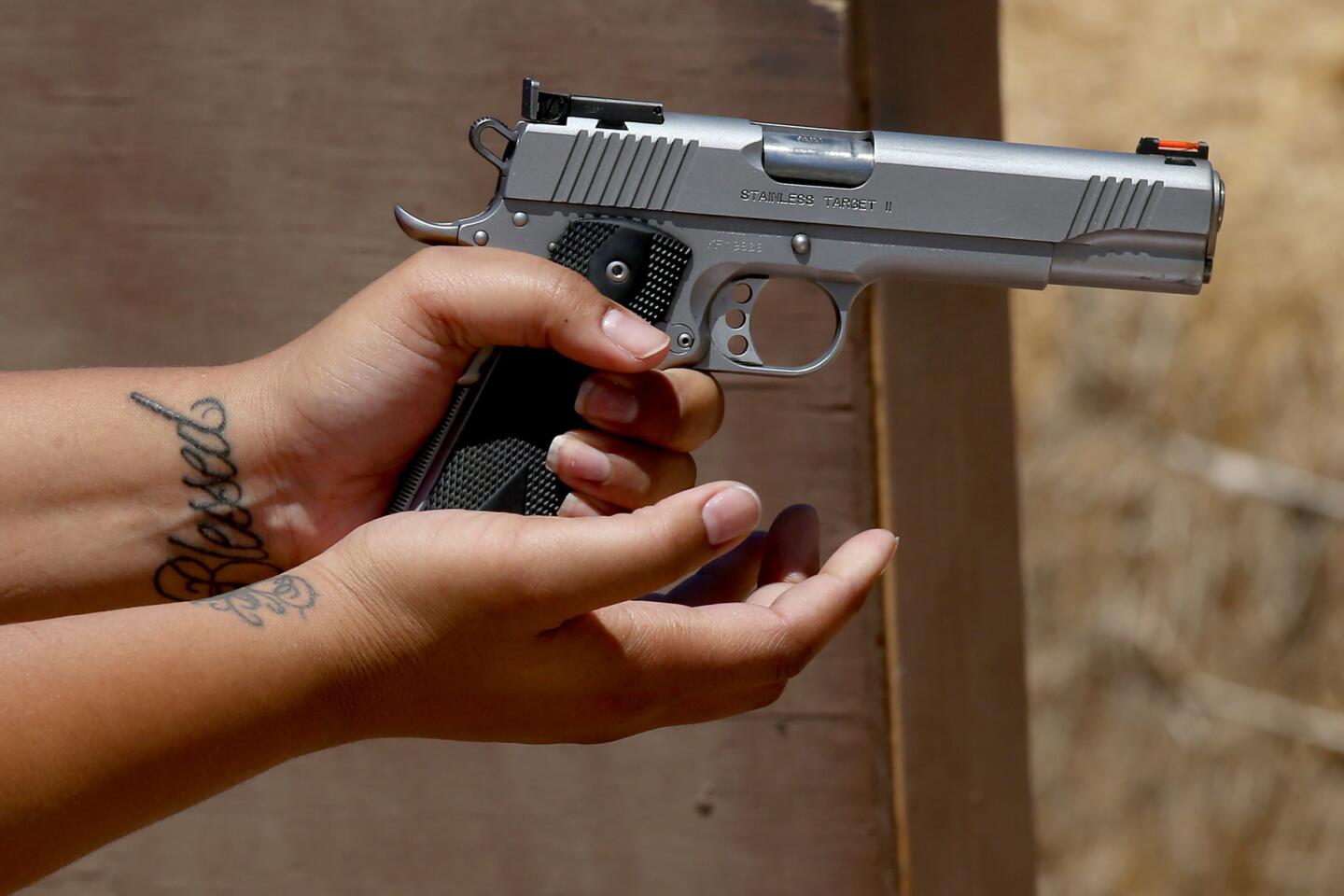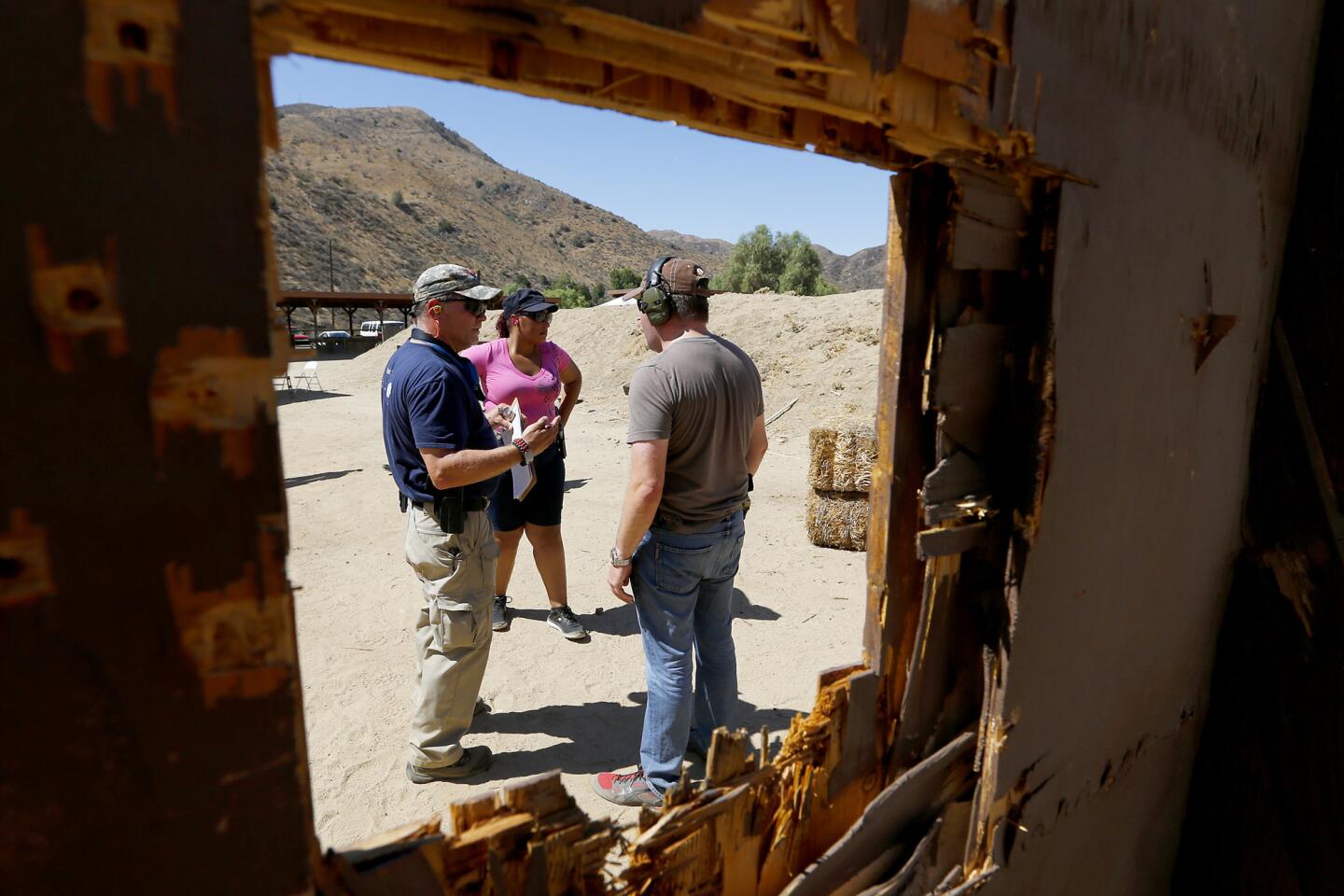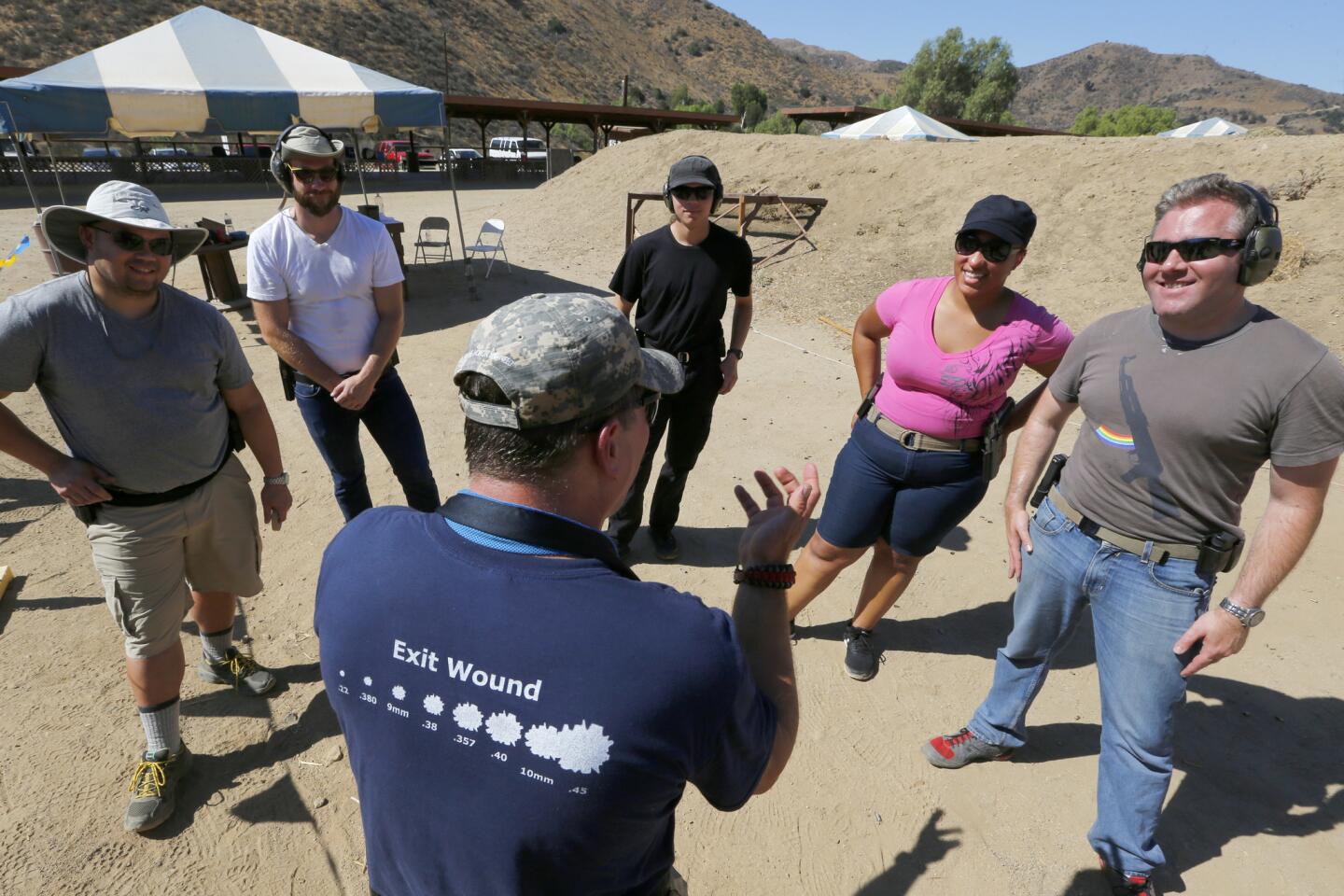Going against the grain after Orlando shooting, LGBT group embraces guns

Members of West Hollywood’s Pink Pistols, an LGBT gun community, take a defensive shooting course in Southern California.
- Share via
Jonathan Fischer is never sure who’s going to be more surprised when he, as he likes to put it, comes out of the gun closet — the gun aficionados who find out he’s gay or the gay friends who find out he likes shooting guns.
When the 38-year-old television editor showed up last month to a defensive handgun class near Piru with a Glock 27 pistol on his hip, he wore a T-shirt sporting a rainbow-colored AK-47. His “gay-K-47,” he said.
In the days after 49 people were fatally shot at the Pulse gay nightclub in Orlando, Fla., this summer, Fischer wanted to do something to make his community safer. So he started the West Hollywood chapter of the Pink Pistols — a loosely organized, national LGBT gun group.
“If someone was to try and break into my home, and especially if someone were armed, I don’t want to fight back with a kitchen knife,” Fischer said. “And I don’t think that’s extremist or crazy.”
It’s a stark contrast to how the overwhelming majority of LGBT activists and organizations responded to the Orlando massacre, which has sparked calls within the community for gun control.
In the wake of the shooting, some gay bars like the Abbey in West Hollywood beefed up security. The same day as the Orlando mass shooting, L.A.’s annual gay pride parade was rattled after a heavily armed man en route to the event was arrested.
For all the anxiety Orlando has caused, many gay activists say becoming armed is not the answer.
“Some people say you need a gun to protect yourself from the bad guys. We just fundamentally disagree with that,” said Rick Zbur, executive director of Equality California. “We don’t want to live in a world where you have to be packing heat to live your daily life.”
But for a small subset of the community, Orlando has become a call to arms.
When the firearms instructor at the range near Piru asked each person in the class why he or she was there, Fischer ticked off several reasons and mentioned the Pink Pistols.
“What is the Pink Pistols group?” a man asked.
There was a pause.
“We’re — a gay gun group,” Fischer said hesitantly. He tried quickly to explain.
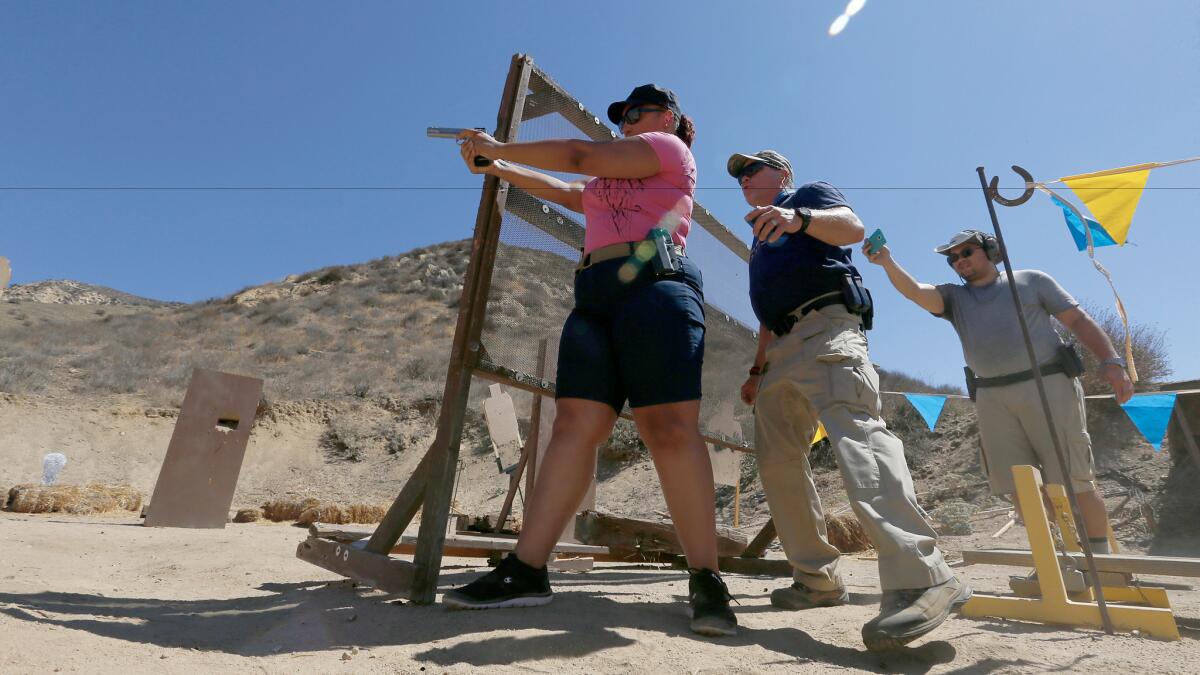
“No, that’s awesome,” the man said, nodding reassuringly.
Interest in the Pink Pistols has increased since the Orlando attack, with new chapters springing up across the country, including the West Hollywood chapter and another one in North Hollywood. There was such an outpouring of support from firearms trainers, many of them straight, that the Pink Pistols’ website now has a map listing LGBT-friendly firearms instructors in every state.
The week of the attack, signs depicting a rainbow-colored Gadsden flag and the hashtag #ShootBack appeared in West Hollywood, where an estimated 46% of the population identifies as lesbian, gay, bisexual or transgender. City officials were outraged.
“Even during our heightened days of civil disobedience and protest, we have only advocated peaceful means, never arming ourselves and retaliating with violence,” said City Councilman John Duran, who is gay.
Gwendolyn Patton, the national spokeswoman for the Pink Pistols, has spent the summer trying to keep up with the all inquiries about the group and how to start new chapters.
“People don’t like to feel helpless,” said Patton, a lesbian who lives outside Philadelphia.
The Pink Pistols has received a mostly negative response from the broader LGBT community, she said. Some LGBT centers, she said, have even specifically banned the Pink Pistols from using their facilities.
The group dates to 2000 when gay author and journalist Jonathan Rauch wrote an article for Salon.com calling for gay people to “set up Pink Pistols task forces,” get licensed to carry guns and arm themselves to protect their community.”
“Not all that many gay people would need to carry guns, as long as gay-bashers couldn’t tell which ones did,” Rauch wrote.
Rauch told The Times he wrote the article at a time when the brutal murder of gay college student Matthew Shepard was still fresh in the public consciousness. It woke people up, he said, to what gay people had known all along: “that we were targets of day-to-day terrorism.”
“There is a huge amount of anti-gay stereotype in America that has to do with weakness — people calling us limp-wristed and fairies,” Rauch said. “Over the years, many gay people came to internalize this stereotype and assume that we are weak and defenseless, and of course we are not.”
The first Pink Pistols chapter, taking its name directly from Rauch’s article, was started in Boston just after its publication, Patton said. Today, there are 50 chapters in the U.S. and Canada.
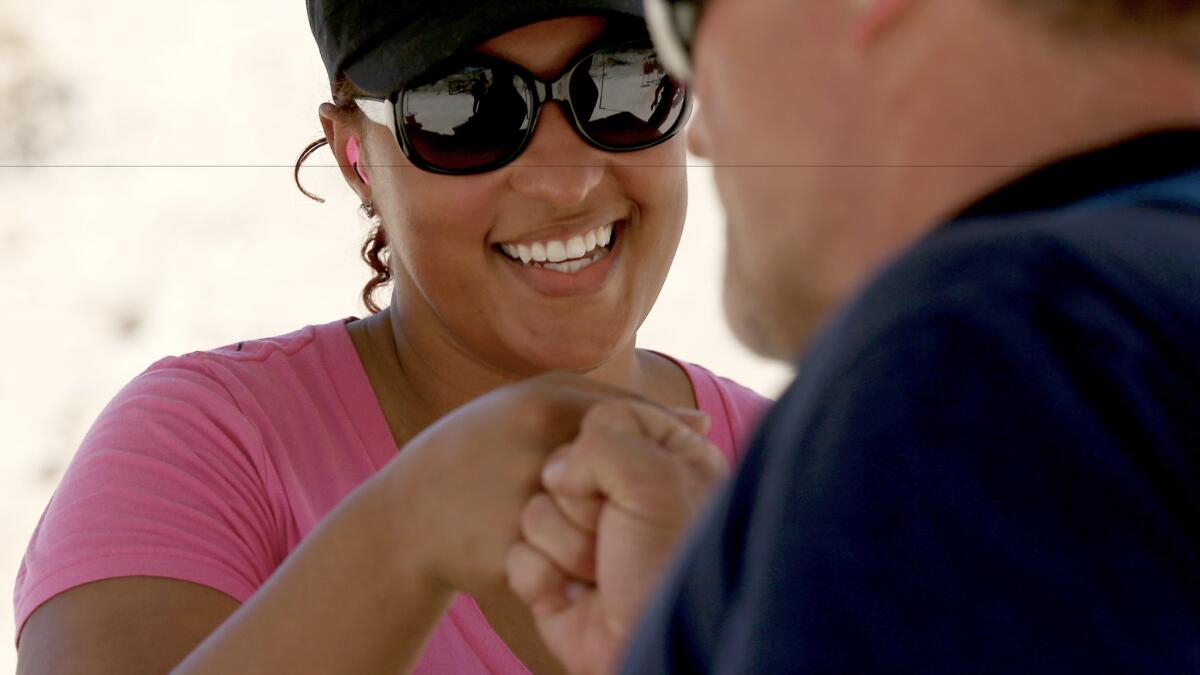
Though the group is not, according to Patton, affiliated with the National Rifle Assn., it has worked with them and has become increasingly involved in gun-control litigation. The Pink Pistols filed an amicus brief in the federal appeals case Peruta vs. County of San Diego — in which the court ruled in June that people do not have a 2nd Amendment right to carry a concealed firearm in public and that local authorities can require people to show “good cause” before issuing them a permit to do so.
“We wish to dispel the misleading and insulting caricature that supporters of Second Amendment rights are either tobacco-chewing, gap-toothed, camouflage-wearing rednecks or militia posers who are morbidly fascinated with firepower,” their amicus brief stated.
Because LGBT people are frequently the targets of violence, they have a “particularly acute need for armed self-defense,” the Pink Pistols argued, adding: “Without self-defense, there are no gay rights.”
The Pink Pistols and LGBT groups that have pushed for more gun control cite violence against LGBT people as a reason for their disparate views.
A fifth of the 5,462 single-bias hate crimes reported to the FBI in 2014, the most recent year for which data are available, were because of the victim’s sexual orientation or identity as a transgender or gender non-conforming person. That was higher than the number of religiously motivated hate crimes and surpassed only by racially motivated hate crimes. And, experts say, the number is disproportionate because of the relatively small size of the LGBT community.
In Los Angeles County, preliminary data for 2015 show that anti-LGBT hate crimes have reached their highest level of violence in over a decade, said Robin Toma, executive director of the county’s Human Relations Commission, which has been tracking hate crimes since 1980.
“Orlando made it very clear to us that common-sense gun safety laws are part of what we needed to be working on,” said Zbur, with Equality California.
Zbur’s organization this summer aggressively lobbied for a package of state gun control bills, including a measure signed into law by Gov. Jerry Brown that requires Californians buying ammunition to undergo background checks.
Zbur dismissed the Pink Pistols as a “small but very vocal fringe group.”
Since the Pulse shootings, more than 100 LGBT organizations have signed a pledge backing gun control legislation. The Los Angeles LGBT Center now includes gun safety in weekly policy discussions. And a growing new group called Gays Against Guns has staged protests across the country.
In a major 2013 Pew Research Center survey of LGBT Americans, they were more supportive of gun control than the general public. A clear majority of LGBT adults, 64%, said it was more important to control gun ownership than to protect the right to own guns, versus 36% who said the opposite. The general population was almost evenly split on the issue, with 50% saying it was more important to control ownership and 48% saying that gun rights mattered more.
At last month’s defensive handgun class near Piru, the instructor, Jeffrey Bova, said he reached out to the West Hollywood Pink Pistols, offering to teach them himself. Bova, a truck driver in the movie industry, said many of his friends and colleagues are gay, and he respected what Fischer was doing.
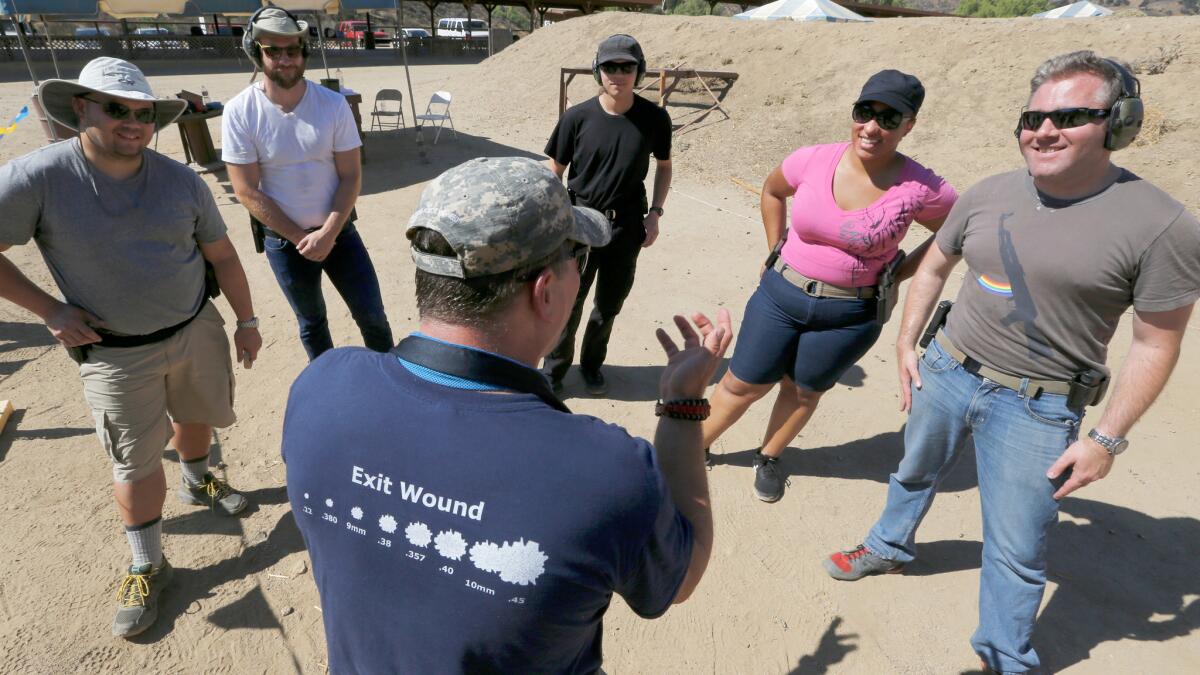
During the class, on a triple-digit day, Bova stood next to Pink Pistols member Elizabeth Southern, trying to get her comfortable with the gun as she practiced drawing it from a holster on her hip. Her back rigid, her shoulders tense, she pulled out the model 1911 pistol and fired, striking a steel plate in the distance. She let out a deep breath, her hands shaking slightly.
“I’m not used to it being loaded and on me,” she said.
“I get it, I get it!” Bova said. “Who walks around with a loaded gun in the holster? … Relax.”
Wearing a pink T-shirt and pink earplugs, with the word “Blessed” tattooed on her wrist, Southern was shooting only for the second time. The 25-year-old Downey resident is bisexual, African American and a woman — and likely to experience discrimination because of all three factors, she said.
Southern joined the Pink Pistols this summer because she was a recent victim of domestic violence and had to get a restraining order against a former boyfriend who threatened to kill her and her young son. She attended the West Hollywood Pink Pistols’ first group shooting event in Sylmar in July. The first time she pulled the trigger, she broke down crying.
“It was the first moment in my life that I felt like I wouldn’t have to live in fear anymore, that I’d be able to protect myself and my family,” Southern said. “I felt an enormous sense of relief.”
Last month, she bought her first gun.
Twitter: @haileybranson
To read the article in Spanish, click here
ALSO
After mass shooting, San Bernardino endures a surge in deadly violence
Videos show violent arrest of Murrieta man who police say tried to grab an officer’s gun
LAPD honors officers for their bravery and, for the first time, their restraint
More to Read
Sign up for Essential California
The most important California stories and recommendations in your inbox every morning.
You may occasionally receive promotional content from the Los Angeles Times.
